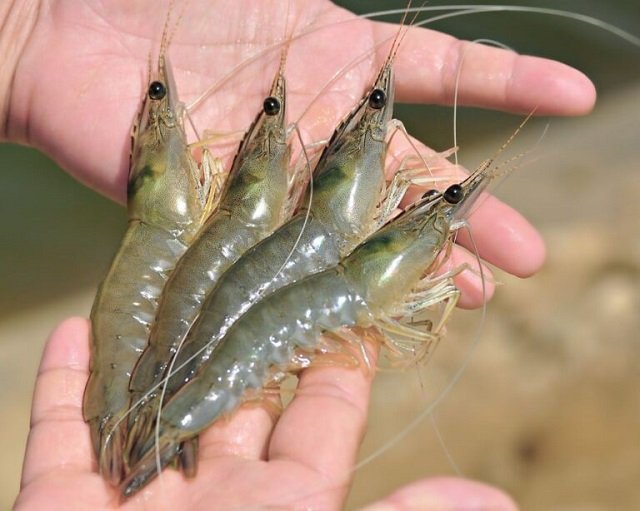
Polychaetes, commonly known as mud worms or marine worms, have been used as food for shrimp and other crustaceans for some time. They are nutritious, promote ovarian maturation, and reduce latency in shrimp. In other words, female shrimp reproduce earlier and more frequently. And the more they reproduce, the more shrimp eventually get harvested on farms and end up on your table as tempura or “sinigang.”
Adding polychaetes to the diet promotes fertility in both male and female shrimp. But what exactly is in mud worms that makes them shrimp food that enhances fertility? So far, we know that the lipid fraction of mud worm extracts is the one that most favors female fertility. However, does the same happen with male shrimp?
In a quest to improve the reproductive capabilities of Penaeus indicus, a groundbreaking study conducted by scientists from the Southeast Asian Fisheries Development Center (SEAFDEC) and the University of the Philippines Visayas (UPV) delved into the effects of different polychaete extracts on male shrimp maturation and sperm quality.
Factors under the microscope
The study employed a meticulous 3×3 factorial design, investigating three levels (0.25%, 0.50%, and 1.00%) of polychaete extracts. Control groups, comprising a basal diet (BD) and a fresh-frozen diet, provided a benchmark for comparison.
The researchers meticulously analyzed parameters such as broodstock survival, maturation rate, spermatophore period, and sperm viability to evaluate the overall impact.
Survival and maturation rates
Surprisingly, the different doses of polychaete extracts did not exert a significant influence on broodstock survival (67–87%) or maturation rate (42–68%).
These findings imply that the tested extracts are well-tolerated by Penaeus indicus, paving the way for further exploration without compromising essential facets of shrimp farming.
Improvement in sperm quality
One of the most notable outcomes of the study was the substantial increase in sperm count among broodstock fed diets supplemented with polychaete extract compared to those receiving the fresh control diet.
The implications of this discovery are profound and suggest that the inclusion of these extracts can significantly enhance sperm production, a crucial aspect of sustainable aquaculture practices.
Stay Always Informed
Join our communities to instantly receive the most important news, reports, and analysis from the aquaculture industry.
Dr. Sheryll Santander-Avanceña, a scientist at SEAFDEC/AQD, noted that, as expected, the diet consumed by male shrimp slightly increased their sperm count. They also found that the sperm of broodstock had improved protein and lipid content. This means that, just as a diet with mud worms improves the fertility of female shrimp, it does the same for male shrimp.
Now, what exactly in the polychaete extracts increased male shrimp fertility? The study identified the total soluble fraction (composed of amino acids) and the neutral lipid fraction (NLF). The study suggested that arachidonic acids present in the NLF improved sperm quality, as this compound and its derivatives are known to stimulate sperm synthesis.
Nutritional impact
The study delved into the nutritional composition of spermatophores and revealed that TSF extracts, in particular, played a fundamental role in increasing crude lipid and protein content.
This nutritional enrichment, especially in the early maturation stages, shows the potential of polychaete extracts as bioactive components capable of stimulating essential aspects of sperm production.
Conclusion and future prospects
In conclusion, this innovative research reveals the promising role of polychaete extracts, specifically TSF and NLF, in increasing maturation and sperm quality of male Penaeus indicus. While further research is needed to identify the specific substances in polychaete extracts that promote male shrimp fertility, the study suggested that customizing maturation diets for both male and female shrimp could be worthwhile.
Looking ahead, further exploration of the nuanced interactions between shrimp physiology and polychaete extracts is key to unlocking new frontiers in sustainable and efficient aquaculture practices.
The study was funded by the Department of Science and Technology-Accelerated Science and Technology Human Resource Development Program, Student Research Support Fund, and SEAFDEC/AQD (FD-02-C0219T).
Contact
Roger Edward P. Mamauaga
Aquaculture Department, Southeast Asian Fisheries Development Center
Tigbauan, Iloilo, Philippines
Email: ssantander@seafdec.org.ph
Reference
Santander-Avanceña, S. S., Traifalgar, R. F. M., Estante-Superio, E. G., Janagap, S. P., Mamauag, R. E. P., Monteclaro, H. M., Laureta, L. V., & Quinitio, G. F. (2023). Reproductive quality evaluation of male Indian white prawn Penaeus indicus broodstock-fed diets supplemented with polychaete extracts (Marphysa sp.). Invertebrate Reproduction & Development. https://doi.org/10.1080/07924259.2023.2227585
Note: Prepared with information from the press release of the Tokyo University of Science (TUS) and the scientific article.
Editor at the digital magazine AquaHoy. He holds a degree in Aquaculture Biology from the National University of Santa (UNS) and a Master’s degree in Science and Innovation Management from the Polytechnic University of Valencia, with postgraduate diplomas in Business Innovation and Innovation Management. He possesses extensive experience in the aquaculture and fisheries sector, having led the Fisheries Innovation Unit of the National Program for Innovation in Fisheries and Aquaculture (PNIPA). He has served as a senior consultant in technology watch, an innovation project formulator and advisor, and a lecturer at UNS. He is a member of the Peruvian College of Biologists and was recognized by the World Aquaculture Society (WAS) in 2016 for his contribution to aquaculture.







